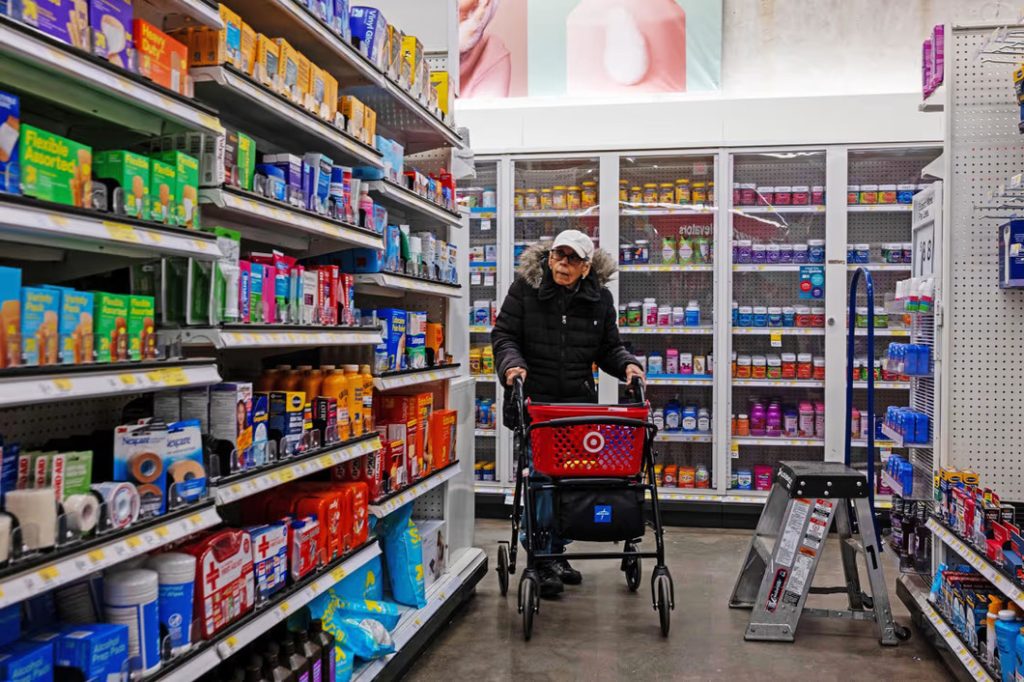The effects of tariffs have been most immediately felt in financial markets, where stocks have wiped out nearly a year’s worth of gains due to concerns over a potential slowdown in economic growth or even a full-blown recession.
Now, companies are starting to issue more concrete warnings about how tariffs could impact their bottom lines — and ultimately, consumers.
Executives at PepsiCo, who reported first-quarter earnings that missed analysts’ projections, highlighted supply chain disruptions and rising costs. The food and beverage giant also lowered its forecast for core constant currency earnings per share, a metric that adjusts for foreign currency fluctuations, citing the impact of tariffs and an increasingly value-conscious consumer base.
“As we look ahead, we expect more volatility and uncertainty, particularly related to global trade developments, which we expect will increase our supply chain costs,” said CEO Ramon Laguarta. “At the same time, consumer conditions in many markets remain subdued, with an outlook that is equally uncertain.”
While Procter & Gamble’s quarterly earnings exceeded estimates, sales fell short of expectations. The company also reduced its full-year forecast for core earnings per share, attributing the decline to both weakened consumer demand and the direct effects of President Donald Trump’s tariffs on operations.
“There will likely be pricing — tariffs are inherently inflationary — but we’re also exploring sourcing options,” P&G CEO Jon Moeller told CNBC on Thursday.
Both P&G and PepsiCo raised prices in recent years due to record inflation, which boosted sales but ultimately led to flattened volumes as shoppers sought out cheaper alternatives or cut back on purchases altogether. Consumers have increasingly relied on credit to manage their cash flow amidst rising prices, a trend that could worsen as tariffs begin to affect household purchases. Both credit card debt and late payments reached record highs earlier this year, and the use of buy now, pay later (BNPL) loans for essential goods has surged.
According to a LendingTree survey published Wednesday, 41% of BNPL borrowers said they had missed at least one loan payment in the past year, up from 34% the previous year. The survey also found that a quarter of borrowers are now using BNPL loans for groceries, compared to just 14% a year ago.
Trump’s trade war is also expected to impact homebuyers soon. The CEO of homebuilder Pulte estimated that tariffs could add as much as $5,000 on average to the price of new homes. “Whether it’s the volatility in the stock market, concerns about tariff-driven inflation, fluctuations in interest rates, or growing fears of a recession, demand in April has been more volatile and less predictable day-to-day,” said Ryan Marshall, CEO of Pulte.
According to CNBC calculations, approximately 75% of S&P 500 companies that have reported earnings through Thursday morning have cited some impact from tariffs in their most recent results.
While Trump has suspended country-by-country tariffs until early July, he has imposed a blanket 10% duty on all imports and set tariffs as high as 145% on Chinese imports. He has also implemented levies on products like steel and autos. This week, Trump hinted at a more conciliatory approach as he seeks new trade deals, but so far, most countries have not accepted his offers.
As a result, companies are navigating a landscape of uncertainty and advising investors to expect lower returns. Earnings reports from other consumer goods giants on Thursday morning revealed similar concerns.
Trump also received warnings about the potential for empty shelves after meeting with major retailers, according to a source familiar with White House discussions. Executives warned that this could begin to affect the July 4 shopping weekend.
The combination of escalating supply chain costs and reduced consumer spending is creating the conditions for empty shelves, according to Neil Saunders, managing director and retail analyst at GlobalData.
“They will have to decide whether it’s worth importing products from China, considering the price hikes might be so significant that consumers won’t be interested,” Saunders said. “At that point, they might just decide not to stock that product at all, leading to gaps on the shelves.”

Ocean container bookings from China to the United States have already dropped more than 60%, according to data from logistics platform Flexport. At the same time, trucking activity out of Los Angeles has fallen 23% year-over-year, causing concern among industry players in the logistics sector.
“Trucking volumes have fallen to levels not seen since before Covid,” Craig Fuller, founder of FreightWaves, posted on X on Tuesday. Citing real-time freight data from the Sonar platform, he added, “With imports declining, volumes are expected to decrease by another 3-4% in the next month.”
As of 2023, imports and exports accounted for over 32% of the freight tonnage moved domestically by truck, according to federal data.
The Federal Reserve’s bi-quarterly Beige Book, which surveys business conditions across its districts, revealed that companies have started adjusting their pricing in response to tariffs, including implementing surcharges rather than raising prices outright.
However, one area that hasn’t yet seen a significant impact is job losses. On Thursday, the Labor Department reported that weekly unemployment claims increased by just 6,000, and the four-week moving average showed no notable uptick. Still, the Census Bureau’s biweekly Business Trends and Outlook Survey, which provides a near-real-time snapshot of economic conditions, indicates that companies’ employment plans continue to weaken.
Bob Elliott, CEO of the investment group Unlimited Funds, suggested that it might take some time for the full effects of the tariffs to be felt by consumers. He pointed out that the demand shock before Covid, when President Jimmy Carter effectively urged Americans to curb their spending to reduce inflation in the 1970s, unfolded over about six months.
“Anecdotally, producers are rushing to complete production before supply chains get disrupted,” Elliott said. “They’re trying to build up inventory and position themselves to have stock on hand to absorb the uncertainty of the tariff environment.”
However, if companies continue to face rising costs, they may begin cutting jobs. Guy Berger, director of economic research at Burning Glass Institute, observed on X that there has been a sharp rise in the number of firms planning to reduce staff.
In a follow-up interview, FreightWaves’ Fuller predicted that logistics companies in Southern California— the region’s second-largest employment sector—are likely to begin reducing their workforce due to their exposure to Chinese import flows.
“That’s when people will really start to see just how bad this is,” he said.

